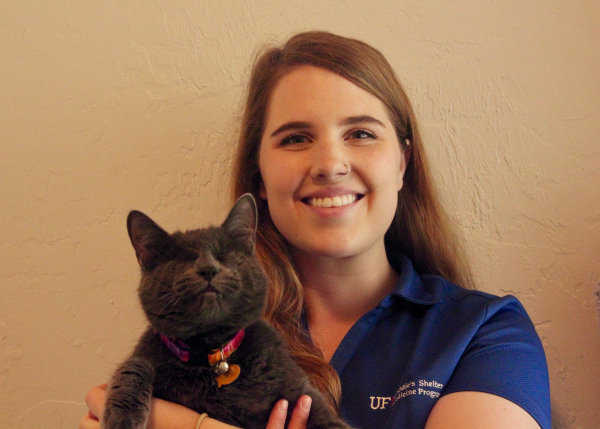 Some students come into veterinary school without knowing shelter medicine even exists. But for Dr. Amelia Sikora, shelter medicine is all there’s ever been.
Some students come into veterinary school without knowing shelter medicine even exists. But for Dr. Amelia Sikora, shelter medicine is all there’s ever been.
“It all started when I was a kid,” the new Maddie’s Shelter Medicine Program intern said. “My mother always had foster cats in our house, and she was always taking us to the local shelter to drop off donations. When I got to veterinary school at Ohio State, for the whole first year they kept warning us to have an open mind, saying that everyone will change their mind on what field they’ll go into.
“But for me, there was never anything but shelter medicine. I cannot see myself doing anything else.”
Today, newly graduated from vet school and with a series of shelter externships under her belt, Dr. Sikora still has her eyes firmly fixed on the prize of a career as a shelter veterinarian as she begins her internship.
While in veterinary school at Ohio State University, Sikora took every shelter medicine elective she could find. “Dr. Jeanette O’Quin inspired me with her courses on the management of infectious diseases, shelter design, enrichment, forensics, and disaster response,” she said. “I took every one of them.”
Her passion for shelter medicine drove her to apply for the internship at UF. “I chose to do the internship at UF because they’re known to have one of the best shelter medicine programs in the country,” she said. “As a veterinarian I want to make a strong contribution to this field of medicine, and I want to help pull shelter medicine to the forefront and get people to realize what an important it is.
“One thing that I dislike is the way so many veterinary students and veterinarians think ‘shelter medicine’ means spay/neuter surgery. All I tell them is, ‘You should live a day in my life and see all the things I do.’ Shelter medicine is so far beyond surgery!”
Having the ability to take care of animals the way she believes they need to be cared for is a big part of what Dr. Sikora loves about shelter medicine. “I got that from my mom at a young age,” she said. “Today we have the Fear Free movement, and we’ve learned so many things my mom was doing back then, like taking everything slow and paying attention to how the animal is responding to what you’re doing. Rushing pets and missing their reactions is a big part of what stresses animals out in shelters or foster homes.”
Dr. Sikora’s year-long internship will take her into a variety of shelters across Florida, giving her experience in shelters with a wide range of resources and challenges. She’ll also be taking the UF Online Shelter Medicine Certificate Course, and in the future plans on working in a large municipal shelter where she can do the most good.
“If I were talking to a veterinary student about shelter medicine, I’d tell them to go for it,” she said. “In the shelter, you do the things that both private practitioners and specialists do. We don’t usually have access to, say, an ophthalmologist, so we might find ourselves doing an enucleation one day, maybe an amputation the next. We’re doing medicine cases. We’re doing forensics. There’s infectious disease management and shaping shelter policy. It’s an incredible opportunity, especially for a new veterinarian, to do it all and not get pigeonholed into one little corner of veterinary medicine.”
More than anything else, though, Dr. Sikora values the opportunity to help animals in need. “When I was doing an externship in Pittsburgh at Humane Animal Rescue, I worked on a dog from a dog fighting case,” she said. “I knew what we were doing would help them prosecute the person who created such a horrible life for this dog.”
Acknowledging such work is emotionally difficult, Dr. Sikora said, “Yes, it’s hard, but someone has to do it. Someone needs to be a voice for these animals.”

